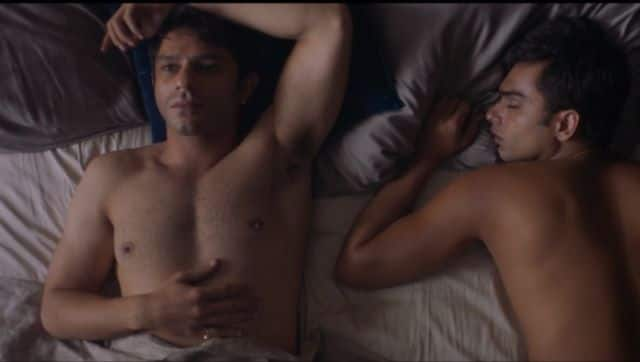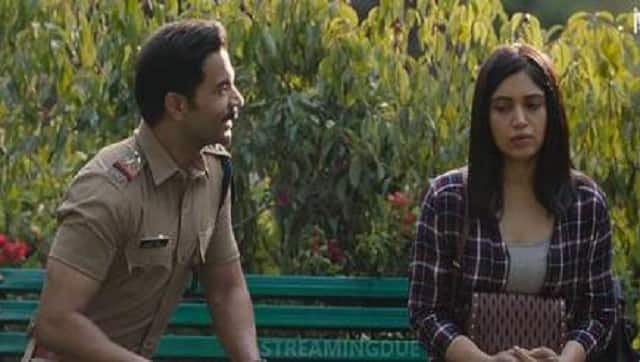How often have you seen a gay cop in a Bollywood film? I cannot recall even one instance prior to Shardul Thakur, beautifully played by actor Rajkummar Rao, in Harshavardhan Kulkarni’s film _Badhaai Do_ . This is not surprising as the adversarial relationship between queerness and the law has defined the precarious lives of gay men since a long time. It was only in 2018 that the Supreme Court read down Section 377 of the Indian Penal Code; until then, gay men lived in fear of a colonial-era law that penalised sexual intercourse “against the order of nature.” The Christian aversion to oral and anal sex was written into law under the British Raj, and stayed on the books even after India became independent in 1947. Given this history, a gay cop would have been an anomaly in popular culture before 2018. No wonder then that the cops we saw in queer stories on screen were men who humiliated, exploited, and raped gay protagonists. They were repulsed by homosexuality, and sought to punish it. Their disgust was couched in moral terms. They were not only maintaining law and order for the state but also protecting the institutions of family, marriage, and religion. Do you remember Onir’s moving film My Brother…Nikhil [2005]? Set in Goa between 1986 and 1994, it revolves around the life of a gay swimming champion named Nikhil Kapoor. This character is played by Sanjay Suri, who is also one of the producers of the film. Kapoor is arrested because he is HIV positive, and kept in forced isolation mandated by law. Himadri Roy, author of the book Reel and the Real: Portrayal of Gay Men in Bollywood Films [2020], commends Onir for depicting “the magnitude of prevailing beliefs and prejudiced opinions in society.” The cops beat Kapoor with sticks. One of them says, “Tumhe goli maar deni chahiye. Bohot aish kar li, kyon sarkar ka paisa barbad kar rahe ho?” [You should be shot dead. You have frolicked enough. Why are you wasting government money?] Onir’s film I Am [2010] features another heart-wrenching portrayal of police brutality against a gay man. Jai Gowda [Rahul Bose] is a managing director in a multinational company. He is caught by a cop [Abhimanyu Singh] while getting physically intimate with another man named Omar [Arjun Mathur]. The cop takes advantage of Gowda’s multiple vulnerabilities. Omar knows him well, and is party to the violence. Roy writes, “The demand of Rs 1 lakh by the cop makes him beg for forgiveness, as he fears that his social dignity and respect for his family is at stake if the policeman goes to his house. He is scared because his real identity, a gay man, will be revealed to his parents and other members of the society.” Gowda tells him, “Mere parents aaye huye hain. Society ke log dekh lenge.” (My parents are visiting. My neighbours will see you walk into our house.) Gowda lands into a trap that is routinely laid out for men like him. His trust is betrayed, his cell phone is taken away, and he is made to surrender his ATM card. This is extortion. The cop, a guardian of heteronormative decency, has no qualms about sexually abusing Gowda. This scene struck a chord with gay men who have experienced such instances personally. Recently, Zoya Akhar and Reema Kagti’s Amazon Prime Video India show _Made in Heaven_ [2019] touched upon the issue of gay men being sexually assaulted in police custody. Karan Mehra [Mathur] is a wedding planner. His landlord – a closeted gay man named Ramesh Gupta [Vinay Pathak] – uses a hidden camera to film him while having sex. When the footage is discovered by Gupta’s wife, he hands it over to the police. Karan is arrested. [caption id=“attachment_10375801” align=“alignnone” width=“640”]  Arjun Mathur in Made in Heaven[/caption] Roy points out that Gowda – who is a migrant to Mumbai – is not only beaten up but also verbally abused for using English and not Marathi, which is the local language in Mumbai. Contrast this with Badhaai Do, where the gay cop approaches a lesbian teacher named Suman Singh [Bhumi Pednekar] to suggest a lavender marriage, also called a marriage of convenience. Thakur wants to marry Singh so that he does not have to come out as a gay man to his family. Since caste plays a big role in matchmaking, that box too has to be ticked. Singh takes up the offer. She likes the idea of having a male roommate to ward off any suspicions about her sexuality. They live as a couple but continue to be romantically and sexually involved with other partners. When the truth is revealed, they are forced to talk about their deepest feelings and aspirations. They decide to adopt a child, and be co-parents. Badhaai Do captures the nuances of the emotional terrain that a gay cop would have to navigate in real life. When Thakur’s colleagues catch gay men kissing or having sex in parks, he has to pretend that he looks down upon homosexuality. He says, “Desh ka mauhal kharaab kar rakha hai.” [These people have ruined the atmosphere in our country.] Nobody at his workplace suspects that he is gay. He has to work hard to keep up his macho image. Thakur tells his wife that he feels uncomfortable around straight men in the police force. “Chor uchakkon se zyada hamaari phatti hai police se.” [Thieves and petty criminals are not as petrified of cops as I am.] His anxiety about being outed intensifies when he is given accommodation in the police colony. Here, he is surrounded by senior cops and their wives. He tries to mimic normative gender roles rooted in a patriarchal and misogynist worldview. [caption id=“attachment_10375811” align=“alignnone” width=“640”]  Rajkummar Rao and Bhumi Pednekar in Badhaai Do[/caption] Thakur is adorable but he is not flawless. This is what makes the character convincing. Thakur is violent with his first boyfriend when he finds out that the man has other partners. He eventually meets someone who loves him, and seems willing to be monogamous. This is Guru Narayan [Gulshan Devaiah], a lawyer whom he runs into at a queer wedding. Thakur needs time to be as out and proud as his partner is. The love gives him that courage. Will Bollywood’s ability to imagine a gay cop in the post-2018 scenario change how LGBTQ+ people think of cops? This is a good question to ask but it is too early to answer. The baggage of the past does not disappear overnight. In the book Ishtyle: Accenting Gay Indian Nightlife [2020], Kareem Khubchandani writes about the collective memory of police raids on gay parties in Bengaluru and Mumbai, and the use of laws – Section 377 and others – to “detain, extort, and rape people.” He calls this “state-sanctioned homophobia and transphobia.” Khubchandani writes about cops who enforced the “no cross-dressing” rule at party venues. This led to the exclusion of transwomen and men in drag. He adds, “While the Criminal Tribes Act was repealed soon after independence, it functioned as a template for the 2011 Karnataka Police Act 36A, which offers police expansive leeway to detain and harass hijras.”
Badhaai Do does not set out to offer the Indian police force an image makeover. The film might resonate with gay men in uniform who are closeted to ensure their own safety at work.
It will probably give them hope, and help them create a life that is free, happy, and fulfilling. Lesbian women who are cops might have a different set of experiences and challenges. Someday, there will be a Bollywood film that explores their stories with depth and sincerity. Queer cops are not a new phenomenon in India; they are new only to Bollywood. In fact, one of the earliest cases of same-sex marriage in independent India involves two women cops from Madhya Pradesh – Leela Namdeo and Urmila Srivastava. Their story became fodder for the news cycle in 1987 when they got married, and were fired from their jobs. Apparently, their colleagues leaked word of their private ceremony. They got unwanted media attention. In the book Queer Activism in India: A Story in the Anthropology of Ethics [2012], Naisargi N Dave recalls that Namdeo, who was a widowed mother of three children, was perpetually described as “sari-clad” in newspaper reports. Srivastava was considered distinctive for “sporting” men’s clothes. Dave writes, “She [Srivastava] was promised at the age of three to a husband who turned out to be a drunk and a wastrel.” Their colleagues saw them eating from the same plate, sleeping in the same bed, and sobbing and consoling each other. Dave writes, “The women allege that they were kept without food for 48 hours, and forced to sign papers they did not understand. Some of the women’s supporters speculated that Urmila was medically examined to ascertain her genital ’normality.’” As we look into this history, Dave reminds us that Srivastava and Namdeo did not identify themselves as lesbian. Perhaps even the term ‘queer’ needs to be used tentatively and cautiously while referring to them. Thakur’s onscreen persona stands on the shoulders of these two women, and many other unsung people whose stories we may never uncover. Chintan Girish Modi is a writer, journalist, and commentator who loves reading. Read all the Latest News , Trending News , Cricket News , Bollywood News , India News and Entertainment News here. Follow us on Facebook, Twitter and Instagram.


)
)
)
)
)
)
)
)
)



